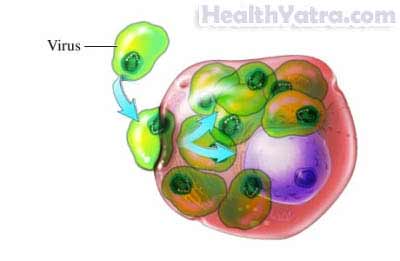Definition
Hantavirus infection is a serious viral disease spread by rodents.

Causes
Hantavirus infection is caused when a person comes into contact with rodents that are infected with hantavirus or infected rodents’ urine or droppings. In the United States, the deer mouse is the rodent most likely to carry hantavirus infection. Hantavirus infection cannot be passed between humans.
Risk Factors
Risk factors that increase your chance of getting hantavirus infection include:
- Living near a forest
- Seeing rodents in your home
- Having rodents present in a work environment
Symptoms
Symptoms associated with hantavirus infection include:
- Fever
- Deep muscle aches
- Severe shortness of breath
Diagnosis
Your doctor will ask about your symptoms and medical history. A physical exam will be done.
Your doctor may need to test your bodily fluids. This can be done with blood tests.
Your doctor may also need pictures of your chest. This can be done with a chest x-ray.
Treatment
There is no specific treatment for hantavirus infection. Treatment will focus on treating your symptoms, providing breathing support, and making you comfortable.
Prevention
The best way to prevent hantavirus infection is to control rodent infestation in and around your home. This involves sealing rodent entry holes or gaps with steel wool, lath metal, or caulk; trapping rodents using snap traps; and cleaning rodent food sources and nesting sites. In addition, take the following precautions when cleaning rodent-infested areas:
- Wear rubber, latex, vinyl, or nitrile gloves.
- Do not vacuum or sweep the area, since this may cause the virus to get into the air.
- Wet contaminated areas with a bleach solution (eg, 1-½ cups bleach in 1 gallon water) or household disinfectant.
- When everything is wet, remove contaminated materials with a damp towel before mopping or sponging the area with the bleach solution or disinfectant.
- Spray dead rodents with disinfectant and double-bag them with all cleaning materials.
- Properly dispose of dead rodents. Contact your health department for disposal methods.
- Disinfect gloves with disinfectant or soap and water before taking them off. Then, thoroughly wash hands with soap and water or a waterless alcohol-based rub (eg, hand sanitizer) if soap is not available.
It is helpful to be aware of activities that may put you in contact with infected mice, their droppings, and their urine. This may include returning tools to sheds, caring for animals in barns, and sweeping or cleaning building spaces. Farm workers may also be at risk from deer mouse bites. While common house mice have not proven to be major carriers of the virus, deer mice are often found in park areas, even within cities. Follow the precautions above when entering spaces that may be contaminated.
